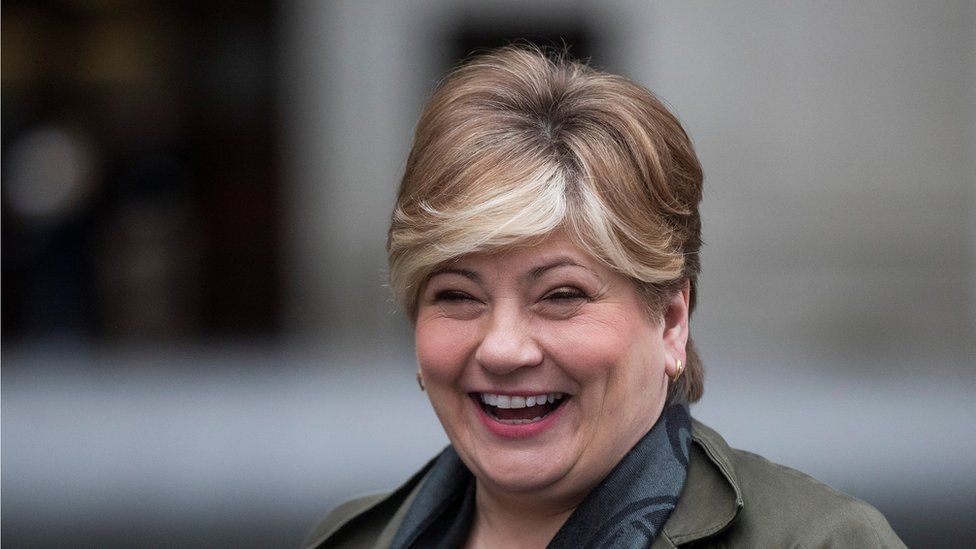Labour leadership contenders: Emily Thornberry
- Published

Shadow foreign secretary Emily Thornberry was the first MP to enter the race to be Labour's next leader, declaring her candidacy just four days after the party's election defeat.
She has been MP for Islington South and Finsbury since 2005 and has served in the shadow cabinet twice, from 2011 to 2014 and again from 2015.
So, what do we know about her?
Personal life
Ms Thornberry was born in Guildford in 1960. Her parents divorced when she was seven, and the family relied on free school meals and food parcels. She has spoken of her upset when the family had to put down its cats as they could not afford to feed them.
While studying for her A-levels, she worked as a cleaner and barmaid, before gaining a place to study law at the University of Kent.
Although she uses her maiden name, Ms Thornberry is entitled to be called Lady Nugee, after her husband, Christopher, was knighted. They have two sons and a daughter, and live in Islington.
Before Parliament
Ms Thornberry was called to the bar in 1985 and worked as a barrister specialising in human rights law.
She became a member of the Transport and General Workers Union in 1985.
In 2001, she made her first bid to be an MP, standing in Canterbury, but she lost to the Conservative incumbent Julian Brazier.
In Parliament
Ms Thornberry was elected to her Islington South and Finsbury parliamentary seat at the 2005 general election, when she won a majority of more than 17,000 votes.
During her time as a backbench MP she focused on health and housing issues.
Having been re-elected on an increased majority in 2010, she was appointed to the shadow cabinet the following year, serving as Ed Miliband's shadow attorney general until 2014.
She resigned her post just after polls closed in the Rochester and Strood by-election. Earlier that day, she had been strongly criticised for tweeting a picture of a house displaying three St George's flags, with the caption "Image from #Rochester".
She was accused of snobbery, with then Prime Minister, David Cameron, saying the tweet was "completely appalling" and suggesting Ms Thornberry was "sneering at people who work hard, are patriotic and love their country".
When Jeremy Corbyn became Labour leader in 2015, she was re-appointed to the party's frontbench, this time as shadow minister for employment.
Later, she was promoted to shadow defence secretary. In this post, she was known for her anti-nuclear position.
In June 2016, Ms Thornberry was promoted again, to the role of shadow foreign secretary. She was also shadow Brexit secretary until leadership rival Sir Keir Starmer took over the role in October that year.
Emily Thornberry takes on Damian Green at PMQs in July 2017.
Ms Thornberry adopted a more pro-Remain position than the Corbyn leadership, criticising its decision not to position Labour as a Remain-supporting party.
During the last Parliament, Ms Thornberry deputised for Mr Corbyn at prime minister's questions, but was replaced after publicly calling for Labour to back another EU referendum.
Leadership bid
After launching her leadership bid with an article in the Guardian, Ms Thornberry told the BBC she believed she could win the contest because she came "from the heart of the party".
She also accused Jeremy Corbyn's advisers of "badly letting him down".
Corbyn 'badly let down' by advisers, says Thornberry
She said she was "tested" at taking on Boris Johnson because she had shadowed him when he was foreign secretary, and knew how to "get under" his skin.
Despite having served in the shadow cabinet, Ms Thornberry told Sky News she would give Mr Corbyn just "two out of 10" for his handling of anti-Semitism and "nought out of 10" for losing the election.
But she gave him full marks for "principle, bringing people into the party, firing up the party".
- Published18 February 2020
- Published7 January 2020